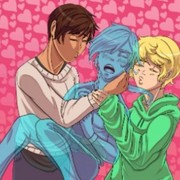Three nights ago
A candle burned in the smithy when he came home. John put his eye to the crack of the door before he opened it. Ned must already be abed, but his mother was sitting there with the Parson, each of them with a tankard filled with ale, and they were speaking in too much of an undertone for him to hear.
When he pushed the door open and went in, both of them fell silent and his mother jumped out of her chair at the sight of his face.
“John! What is it? What’s the matter?”
That pulled him up short. It wouldn’t do to worry his mother, who so depended on him. John turned away from them and ran his hands over his face, trying to push it back into a semblance of calm. When he felt more himself, he hung his cap on the peg by the door, and went to the table, and sat down, and told his mother and the Parson everything that had happened in the forest, when the sun had gone down and the Screech-Owl had come.
When he had laid it out in slow level words that omitted no necessary detail, he folded his arms and leaned back in his chair at the head of the table. “There,” he said softly. “Now advise me.”
His mother looked at the Parson in something like panic. Parson Plumtree, sitting with his hands linked on the table before him, did not move his head, but his eyes flicked across to John. “What do you mean to do?”
John stared at the tabletop, half-convinced that there was nothing he possibly could do. But with his mother and the Parson staring at him aghast for Janet’s fate, the words sounded none so well.
The Parson unclasped his hands and rose from the bench. “Whatever you do, you must do it soon. The banns have been published, and the wedding declared for Sunday.” He took his hat from the peg by the door. “And now, if you will allow it, I will go to Master Fuller and acquaint him with these things.”
“Wait.” John pushed his chair back. “That’s my office.”
In the street as he went past Goody Kirkland’s house a shutter creaked. If anyone else was awake who knew that he and Janet had gone walking in the forest and never returned by sunset, no doubt they were watching too. By morning it would be all over the village. John knew they would blame him for losing the tailor’s daughter and somewhere inside a hot indignation began to burn. Janet had gone to the faerie market. Janet had eaten the faerie fruit. Why should he be blamed when Janet fell into trouble?
There was a scuffle of feet behind him and John glanced back to see who was following him from the smithy. It was the Parson. He did not speak as he fell into step beside John, but his presence brought with it all the things that had been implied in his last words. Yes, and it was true that the banns had been read. It was true that he, John, had promised to marry the tailor’s daughter and it was true that he had published that promise to the whole village for three Sundays in a row.
At the courts of law, that made her his wife in all but name. At the court of conscience, it bound him to deliver her or die in the attempt. Neither authority permitted him to seek any other wife until this one was retrieved and his promise lawfully released by common consent.
He remembered the cowardly hope which had touched him on the homeward path, that Heaven had put Janet beyond his reach, and his face reddened.
He knocked at the tailor’s door. It opened at once and Master Fuller confronted him with an uncertain mood that fell somewhere between anger and jocularity. “You’ve brought my daughter home, have you, you villain?”
“No, sir,” John said. At the look that crossed the tailor’s face, John forgot the fine points of law and conscience, and remembered Janet as he had seen her last, scornful and alien, pulled like a mask over something eerie and horrible.
“No, sir,” he said again, whipping off his cap. He could not enter that house; he could not face Mistress Fuller or Lettice—poor Lettice, he had crushed her cap again. He could not face their grief, and it would be worse to face their kindness. He took a step back from the door. “Parson will tell you what happened. But I have come to tell you that I have lost your daughter, and I mean to find her again. No matter how far I must go. No matter how long it takes.”
There was a long sickened silence. At last Master Fuller nodded at him and waved the Parson inside. The tailor’s door closed with a snick and John wrung his cap again, for it gave him some comfort to feel the starched wool collapse.











Comments (0)
See all